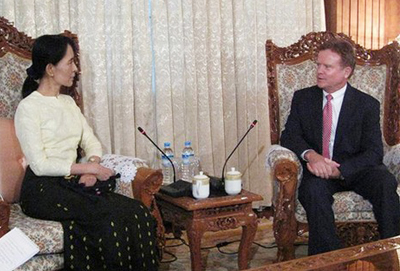
| By AUNG ZAW | Sunday, August 16, 2009 |
US Sen Jim Webb’s timely visit to Burma has secured the release of the American intruder John William Yettaw, but the overall mission has received mixed reactions from observers and campaign groups.
The visit must not lend any legitimacy to the repressive dictatorship and even more pressure must be applied on the generals, say opposition groups.
Debbie Stothard, the coordinator of the Southeast Asia-based Altsean Burma, said the junta’s leaders granted Webb face-to-face meetings with Snr-Gen Than Shwe and Aung San Suu Kyi only because of unprecedented international and regional pressure.
 |
| US Senator Jim Webb meets with Burma's pro-democracy leader Aung San Suu Kyi in Rangoon on August 15, 2009. (Photo: Reuters) |
Well-informed sources told The Irrawaddy that before Webb’s non-official visit, Snr-Gen Than Shwe authorized secret discussions between Burmese and US representatives in a calculated diplomatic maneuver to deflect international pressure stemming from the sentencing of Suu Kyi.
The Burmese side gave the green light to the senator’s visit shortly after her bizarre trial ended last week. Webb arrived days after the conviction, and Yettaw’s release came a few days later.
In the past, the regime has played similar tactical maneuvers to dilute international pressure. Burma watchers recall that in February 1994, US Rep Bill Richardson was allowed to meet Suu Kyi for more than five hours at her house.
This newest gesture comes at a moment when the Obama administration is set to release its new Burma policy, following rising signals that US officials are open to new approaches on Burma, including, perhaps as a first step, the lifting of visa bans on Burmese officials and restoring the post of ambassador in Burma. Yettaw’s release sends a conciliatory signal to the US and European Union and carries the potential to deflect stronger sanctions. The US expanded its sanctions only last month.
Than Shwe, who granted Webb a personal audience in the fortress capital of Naypyidaw, also allowed him to meet Suu Kyi, the detained Nobel Peace Prize winner who last week received an additional 18-month suspended sentence and is now under house arrest in her lakeside home.
Burma watchers warn that Yettaw’s release is purely superficial because Suu Kyi and 2,100 other political prisoners remain in prison. Real substance is needed to justify US, or international, policy changes, and yet there’s a danger that the regime could manipulated the event to its advantage.
The Democratic senator, who noted that he asked for the release of Suu Kyi, said in a press statement: “It is my hope that we can take advantage of these gestures as a way to begin laying a foundation of goodwill and confidence-building in the future.”
A senior US security official said last week that Webb did not carry a message from the US administration, but the White House followed the visit closely and welcomed it.
“It is important for the Burmese leadership to hear the strong views of American political leaders about the path it should take toward democracy, good governance and genuine national reconciliation,” said Mike Hammer, a spokesman for the National Security Council.
On Saturday, Fred C. Lash, a state department spokesman, reiterated that Yettaw’s release was a welcome step but more is needed.
“We also call on Burmese authorities to release unconditionally Aung San Suu Kyi and all of Burma’s more than 2,100 political prisoners in order to begin a process of national reconciliation and inclusive political dialogue,” he said.
Chiang Mai-based Burma analyst, Bertil Lintner, a Swedish journalist and author of several books on Burma, said, “It is naïve to expect these generals to listen to America and change their course.”
Regime watchers noted that a background drama involving Burma and China was also unfolding during Webb’s visit. China’s unchallenged economic influence in Burma is growing, and Asia’s largest power clearly enjoys a regional strategic advantage in its unchallenged relationship.
Webb noted in an earlier statement: “As the United States continues its attempt to isolate Burma due to the human rights policies of its military regime, China’s influence has grown exponentially.”
However, Lintner said, “There’s no way that Burma will give up China because of America.”
Burma’s main concern, he said, is to maintain its good relationship with China and India, its two powerful neighbors, followed by Asean and a good relationship with the rest of the world including the U.S and EU.
A veteran Burmese journalist told The Irrawaddy that the regime’s relationship with China is deeply rooted, but even so Than Shwe and other top leaders are unhappy that China lends its political support to ethnic armed groups along the Sino-Burma border, in fear that clashes between the junta’s troops and ethnic armies could unleash a wave of refugees seeking safety in China, much like what has happened on the Thai-Burmese border.
Only this month, about 10,000 people, including Kokang and Chinese migrants, sought shelter in China after tensions increased between government troops and the Myanmar [Burma] National Democratic Alliance Army, a Kokang ceasefire group.
“Than Shwe is a clever chess player, and he may want to send a signal to China that he could have better relations with America,” said the Rangoon-based journalist.
However, considering the regime’s heavy reliance on China in terms of military hardware, trade and investment, plus a planned gas pipeline into Yunnan Province, he said, “The 20-year-old girl [Burma] is now pregnant, and she is not going to leave her husband [China] anytime soon.”